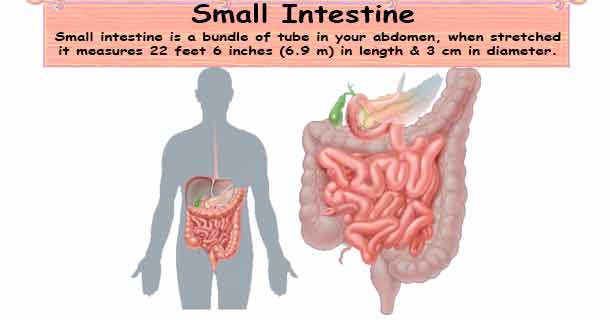Small intestine is a bundle of a continuous tube located in your abdomen. When stretch out this intestinal tube of a well-developed adult; it measures about 22 feet 6 inches (6.9 m) in length and 3 cm in diameter.
Small bowel
The small intestine is an important organ that plays a role of both food digestion and nutrient absorption. The partially digested food called chyme reaches the small intestine from the stomach. After small intestine performed its duty of further digestion and absorption of the nutrients, the digested food is passing on to the large intestine.
The small intestine is sub-divide into three structural parts; they are Duodenum, Jejunum, and Ileum.
The small bowel is a complex organ, and it performs complex function. Various small intestine disorders may affect the function of the small intestine. Some of the small intestinal problems are listed below; few among them are common that is at-least 10% of the people being the effect at some time in their lifespan, and others are rare small intestine diseases.
Small bowel is important organs, which perform vital function of nutrient absorption. It absorbs fats, fat-soluble vitamins, proteins, carbohydrates, electrolytes, minerals, and water.
Small Intestinal Disorders
- Stomach flu (enteritis)
- Cholera
- Giardiasis (or beaver fever)
- Coeliac disease (autoimmune disorder of the small intestine)
- Inflammatory bowel disease
- Small bowel bacterial overgrowth syndrome (small intestinal bacterial overgrowth (SIBO))
- Carcinoid (also carcinoid tumor)
- Meckel's diverticulum (congenital diverticulum)
- Gastric dumping syndrome (rapid gastric emptying)
- Ascariasis (parasitic roundworm Ascaris lumbricoides)
- Tropical sprue
- Lakeworm infection
- Intussusception
- Mesenteric ischemia (or Mesenteric ischaemia)
- Small intestine cancer
Please visit back after some day is for detail information and treatments (by both modern and alternative medicines) for the above-said small intestine problems.

